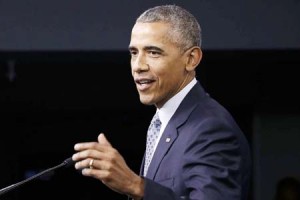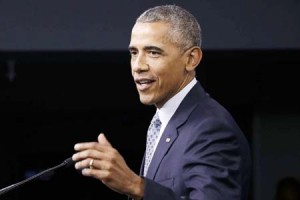- He is preparing to repudiate decades of U.S. deterrence policy
Wall Street Journal
 With his time in office winding down, President Obama plans to make a valedictory round of changes to U.S. nuclear weapons policy. The aim is to cement his cherished “Prague agenda,” named for the Czech city where in 2009 he set out his vision for a nuclear-free world. The moves would more likely cement his legacy for arms-control illusions that are producing a new era of nuclear proliferation.
With his time in office winding down, President Obama plans to make a valedictory round of changes to U.S. nuclear weapons policy. The aim is to cement his cherished “Prague agenda,” named for the Czech city where in 2009 he set out his vision for a nuclear-free world. The moves would more likely cement his legacy for arms-control illusions that are producing a new era of nuclear proliferation.
Mr. Obama’s Prague agenda has consisted mostly of shrinking and weakening the U.S. nuclear arsenal, as he did by signing the 2010 New Start Treaty with Russia and deferring modernization of aging nuclear platforms. This gives America’s friends reason to doubt its nuclear umbrella, while giving adversaries greater incentive to grow their arsenals.
Our sources suggest the President won’t fight congressional support for modernization such as developing a new air-launched long-range cruise missile and a new ground-launched missile to replace the decaying Minuteman III. Both have bipartisan backing, as seen in a recent letter from 14 Senators including Hillary Clinton running mate Tim Kaine. Mr. Obama also isn’t likely to unilaterally extend the New Start Treaty past 2021, which would be especially reckless given Russia’s failure to meet its arms treaty obligations.
Now the bad news: Mr. Obama may declare a policy of nuclear “no first use” (NFU), meaning the U.S. would commit never to use nuclear weapons unless an adversary does so first. This would abandon seven decades of strategic ambiguity concerning when the U.S. might use nukes—and in the process undermine U.S. deterrence against the likes of North Korea.
“The fatal flaw of the warm and progressive-sounding NFU proposal is that it tells would-be aggressors that they do not have to fear U.S. nuclear retaliation even if they attack us or our allies with advanced conventional, chemical, and/or biological weapons,” warns former Pentagon official Keith Payne. Leaders from Pyongyang to Tehran, Moscow and Beijing would feel “greater license” to act as aggressively as possible short of nuclear war.
Hence the grave concern of U.S. allies. An NFU declaration by the U.S. would be “unacceptable,” a senior Japanese official told Kyodo News last month, a sentiment echoed in South Korea. In a July 19 letter to U.S. Defense Secretary Ash Carter, reported here for the first time, Britain’s defense minister said the British and French governments fear the “serious ramifications” of a U.S. policy change and “would regret any decisions which could highlight a divergence of approach among the [three allies] to potential adversaries.”
The Obama Administration’s 2010 Nuclear Posture Review recommended against no first use. It also said Russia was no longer a U.S. adversary, an assessment that no longer holds. So with the world far more dangerous than it was six years ago, on what grounds could Mr. Obama justify junking that former recommendation?
Our sources say the President has also decided to seek a United Nations Security Council resolution banning the testing of nuclear weapons. This means that two decades after the U.S. Senate refused to ratify the Comprehensive Test Ban Treaty, Mr. Obama may usurp the Senate’s constitutional treaty powers with an end-run to the U.N.
This would be bad nuclear policy and an even worse abuse of power. A ban would force the U.S., which hasn’t conducted a nuclear test since 1992, into permanent reliance on computer simulations to keep its weapons reliable and effective, even as technology and threats change unpredictably. A Security Council ban wouldn’t prevent proliferation or testing by dishonest parties like Russia, while honest states like the U.S. are left without verification or enforcement mechanisms.
Asked about the idea last year by Congressman Trent Franks, senior State Department official Rose Gottemoeller said clearly, “We do not agree with this notion.” Mr. Franks followed up: “You are assuring me that this is not being pursued?” “Correct,” said Ms. Gottemoeller. In case that wasn’t clear enough, Pentagon official Robert Scher told Congress last month that Ms. Gottemoeller “stands by the statement” that going to the U.N. “would take away the prerogative of the Senate for ratifying treaties.” No kidding.
Mr. Obama has already entered brave new worlds of executive overreach by ignoring Congress on immigration and sending the Iran deal to the U.N. before submitting it (as a non-treaty) to the Senate. This would be a new low, undermining America’s nuclear deterrent while showing contempt for constitutional bounds.



